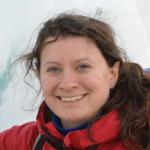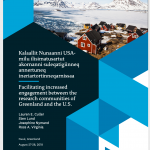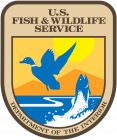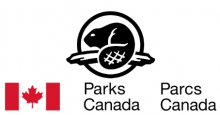Facilitating increased engagement between the research communities of Greenland and the U.S.: Nuuk, Greenland - August 27-28, 2018
Greenland is an important research site for scientists from around the world. Because of its unique physical environment and geographic location between North America and Europe, the United States has a significant research presence in Greenland. This presence provides opportunities to strengthen bilateral cooperation with the research community of Greenland. At the ''Facilitating Engagement'' workshop leading Arctic researchers from the U.S. and Greenland will discuss and develop guidelines and frameworks for cooperative work, including knowledge co-production, community engagement, Indigenous perspectives, and student training and education. This workshop has the potential to build the national capacity of the U.S. for conducting ethical research in domestic and international locations, particularly when work is undertaken in Indigenous homelands. Outcomes also include an international and diverse network of Indigenous and non-indigenous scientists from the U.S. and Greenland. This will facilitate cross-cultural and interdisciplinary Arctic research that includes Indigenous perspectives and meets the needs of Arctic communities at home and abroad. This workshop aligns with NSF's Strategic Objective 1.2: Advance the Practice of Research, which states ''NSF will promote a research culture that is broadly inclusive in its demography and range of intellectual ideas,...is globally engaged, with increased opportunities for exchanging ideas and collaborating on an international scale. NSF will increase opportunities for broadening the training of U.S. graduate students and early-career researchers through international exchanges and partnerships with industry.''
Currently, many U.S. scientists pursue a Western model of research, for which they conduct science but have little, if any, contact with Greenlandic researchers and communities. To explore a new model for research in Greenland, 20-24 researcher from the U.S. and Greenland will meet for two days in Nuuk, Greenland to co-develop a bilateral model for collaborative research, outreach, and education that involves: 1) knowledge co-production by members of the U.S. and Greenlandic research communities and 2) increased community engagement and student education. Participants will represent a range of research disciplines, experiences, and backgrounds. The workshop will include presentations and discussions about research infrastructure in Greenland and U.S. government agency support of Arctic research. Participants will share and discuss personal experiences within the workshop topics. In addition to forming a bilateral network of researchers who have an interest in future collaborations, these activities will lead to a report that includes a set of recommendations from the U.S. and Greenlandic research communities about priorities and needs for increased research, outreach, and education collaborations.
This award reflects NSF's statutory mission and has been deemed worthy of support through evaluation using the Foundation's intellectual merit and broader impacts review criteria.
To explore a new model for research in Greenland this project will host a science research workshop in Nuuk, Greenland that will bring together researchers from Greenland and the United States to discuss how to increase and facilitate successful scientific collaborations. Expected outcomes include: (1) a strong bilateral network of researchers who have an interest in future collaborations; and (2) a report that includes a set of recommendations from each of the US and Greenlandic research communities about priorities and needs for increased research, outreach, and education collaborations. The two-day workshop will take place in Nuuk, Greenland from 27–28 August 2018, hosted locally at the Greenland Institute of Natural Resources. The PI and her co-PI, Ross Virginia, plus 14 US participants and 30 Greenlandic participants will travel to Nuuk to attend the workshop. Day 1 of the workshop will focus on the co-production of research, while Day 2 of the workshop will focus on outreach, education, and community engagement.
Resources
Facilitating increased engagement between the research communities of Greenland and the U.S. Institute of Arctic Studies
Publications
Mercer, J.L., J. Nymand, L.E. Culler, R. Lynge, S. Lund, B. Gregersen, B. Makens, R.A. Virginia, and K.G. Moore, 2022: Bilateral collaboration between the Greenland (Kalaallit Nunaat) and United States Research Communities - from a vision to everyday practice. Polar Record, vol 58, https://doi.org/10.1017/S0032247422000298.
Project Outcomes
This Project Outcomes Report for the General Public is displayed verbatim as submitted by the Principal Investigator (PI) for this award. Any opinions, findings, and conclusions or recommendations expressed in this Report are those of the PI and do not necessarily reflect the views of the National Science Foundation; NSF has not approved or endorsed its content.
The Greenland and U.S. research communities invest substantial resources towards understanding global processes, environmental change, and social-cultural issues in Greenland. As the need for this research intensifies along with the rate of Arctic change, both research communities seek new and stronger bilateral collaborations that leverage resources and expertise held by researchers, stakeholders, and community members. The production of new knowledge through these collaborations along with increased community engagement and student education will place the U.S. and Greenland at the cutting edge of Arctic research. It will strengthen U.S.-Greenland relations and prepare a future generation for taking on the challenge of navigating the new Arctic.
Starting in 2018, through the grant- Facilitating increased engagement between the research communities of Greenland and the U.S.- we planned and hosted a two-day workshop (27-28 August 2018) at Pinngortitaleriffik (Greenland Institute of Natural Resources, GINR), in Nuuk, Greenland, where diverse participants from the U.S. (19) and Greenland (29) research communities explored possibilities for strengthening U.S.-Greenland collaborations. Participants set priorities for future work and funding related to: Research & Co-Production of Research, Public Outreach, and Education & Student Training. We then wrote and published a workshop report to capture many thoughtful, creative, and overwhelmingly enthusiastic ideas and recommendations for improving the way that the U.S. and Greenland researchers collaborate on important Arctic projects. To disseminate the report and its findings, we organized symposia and discussions at national and international venues in fall 2019 and published a final report that is dual language- English and Kalaallisut (Greenlandic)- in 2020.
During this project we developed and shared ideas for the co-production of research, community engagement, and student training in Greenland. These ideas can be used to shape policies that determine how U.S. scientists approach working in Greenland. Models of bilateral co-engagement, including Indigenous perspectives, will be relevant to the development of innovative research approaches throughout the Arctic and beyond. The key finding from the workshop was that U.S.-Greenland collaborations will strengthen if researchers work together intentionally and continuously. This includes starting collaborations early to co-define project questions and objectives and allowing adequate time to develop trusted partnerships with defined roles. The report contains specific ideas, mechanisms, and contacts that we hope will be helpful to U.S. and Greenland researchers as they consider the following recommendations in their future work:
- Host workshops, symposia, and scholar exchanges year-round that bring researchers together in person
- U.S. universities with significant research presence in Greenland should pursue self-funding for workshops and student and scholar exchanges
- Use online networks and websites to describe research projects based in Greenland and seek collaborations
- Co-develop research priorities, codes of conduct and best practices for collaboration and research co-production
- Engage potential research partners and Greenland communities early and often during research
- Make public outreach and training of U.S. and Greenland students an explicit goal of all research projects
The broader impacts of this workshop include an international and diverse network of western and Indigenous researchers from the U.S. and Greenland who have an interest in future collaborations; and a report that includes co-developed recommendations by the U.S. and Greenland research communities about priorities, needs, and ethics for increased research, outreach, and education collaborations. U.S. researchers in particular will have increased capacity for 1) cross-cultural, interdisciplinary polar environmental change research that emphasizes Indigenous perspectives; 2) framing and communicating scholarship to meet the needs of Arctic communities; 3) recognizing, assimilating, and communicating traditional knowledge; and 4) science diplomacy through collaborations with Greenland. We hope that this report is also helpful to the broader Arctic research community and will help funding agencies understand the opportunities and challenges of interdisciplinary and international collaborative research in Greenland.
In sum, research in Greenland is of substantial relevance to Greenland society and will continue to shape our understanding of global processes and rapid Arctic change. The representatives of the U.S. and Greenland research communities who participated in this project acknowledged that we can do better research by working together, considering more diverse perspectives as we conduct our research, articulating the benefits of research to Greenland society, and training the next generation in a collaborative framework. This project has already led to the development of joint proposals, revised project plans related to education and outreach, and plans for future events that will emphasize the growth and potential of U.S.-Greenland collaborations on Arctic research.




